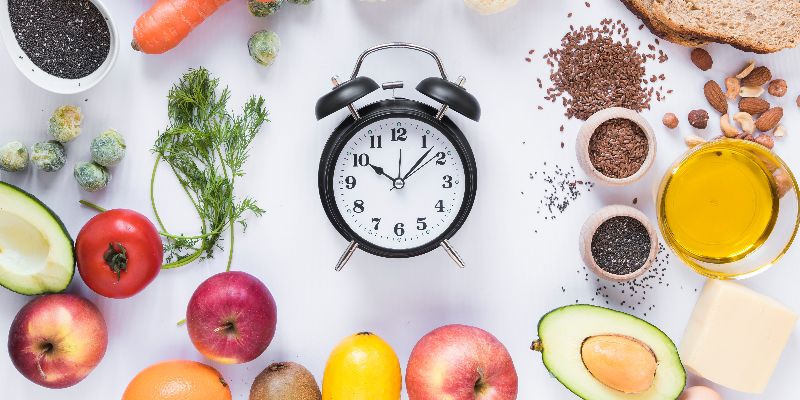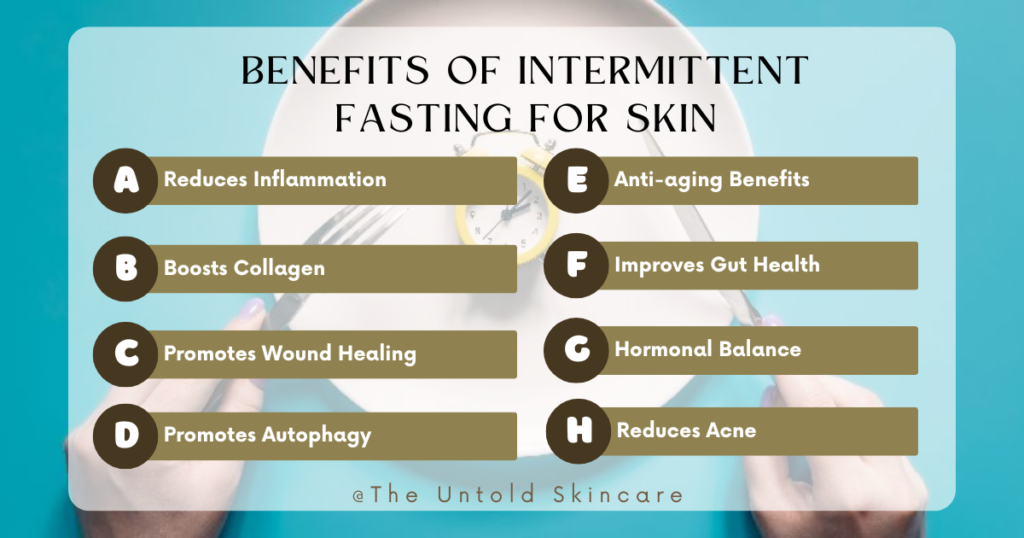People always seek innovative ways to improve their skin health. There has long been debate over the benefits of a healthy diet, good products, and lifestyle modifications to improve skin health.
One skincare strategy that is new and has gained significant attention in recent years is Intermittent fasting.
But does intermittent fasting genuinely offer benefits to your skin?
That is the question we will be answering in this article.
So buckle up, because in this journey to clear and healthy skin, we’ll explore the science-backed wonders of Intermittent Fasting and how it can revolutionize your skincare game. Now let’s start.
What is Intermittent Fasting? Let’s First Understand That

Intermittent Fasting is an eating pattern that involves switching between periods of eating and fasting. In this eating pattern, you refrain from consuming any calories for a certain period of time.
Intermittent fasting is not about starving yourself but rather about controlling the timing of your meals. It doesn’t prescribe specific foods but focuses on when you should eat.
The primary idea behind intermittent fasting is to create windows of time where you consume your meals and periods where you abstain from eating altogether.
Intermittent Fasting has been proven to benefit tons of health-related issues. The advantages of intermittent fasting for skin health, however, is a relatively new field, but it has been supported by several studies and shown to have excellent advantages for the skin.
The Benefits of Intermittent Fasting For Skin

Reduces Inflammation
One of the key benefits of intermittent fasting for skin is its ability to reduce inflammation.
Inflammation is a major driver of most of the skin issues, like acne, rosacea, psoriasis, and many more. Intermittent fasting helps reduce overall systemic inflammation in the body.
Intermittent Fasting decreases the levels of inflammation in the body and the cytokines in the body that cause inflammation, and this has been studied and proven.
It is also associated with improved insulin sensitivity and regulation of blood sugar levels. When you consume fewer calories in a restricted time window, your body becomes more efficient at managing glucose.
Spikes in blood sugar can trigger inflammatory responses, potentially exacerbating skin issues. By stabilizing blood sugar levels, intermittent fasting may help prevent these spikes and reduce skin inflammation.
It can significantly help those suffering from extreme skin conditions such as psoriasis, eczema, and hidradenitis suppurativa.
In a study examining how calorie restriction affected the side effects of topical retinoid therapy, there was a considerable decrease in retinoid-induced skin irritation without impairing the medication’s therapeutic effects. This also verifies the anti-inflammatory properties of intermittent fasting.
Boosts Collagen
Collagen is the holy grail of youthful skin. It’s the protein responsible for maintaining your skin’s elasticity and preventing sagging. Unfortunately, as we age, our collagen production decreases, leading to wrinkles and fine lines.
But here’s where intermittent fasting steps in as the hero of the story. Fasting has been shown to boost collagen production. When you fast, your body activates genes that help create more collagen, effectively turning back the clock on your skin.
Intermittent fasting also stimulates the release of growth hormone (GH). GH plays a crucial role in tissue repair and regeneration, including the synthesis of collagen.
Also, high insulin levels can interfere with collagen production by promoting the breakdown of collagen fibers. By reducing insulin levels and maintaining stable blood sugar, intermittent fasting supports collagen integrity.
Promotes Wound Healing
Several studies have verified that intermittent fasting is highly capable of tissue repair and regrowth that can promote the wound healing process.
It has been proven that the calorific restriction due to intermittent fasting increases skin macrophage activity. The production of signaling protein during macrophage promotes keratinocyte proliferation, which is essential in skin protection.
Additionally, macrophages also secrete VEGF, a growth factor that works as an important signaling protein in the growth and maintenance of skin tissues and blood vessels.
Promotes Autophagy
Intermittent fasting can trigger autophagy, a cellular process that involves the breakdown and removal of damaged or dysfunctional components within cells.
During fasting, the body experiences a reduction in available energy from food intake. To compensate for this energy deficit, cells may initiate autophagy as a means of recycling and repurposing cellular components to generate energy.
This helps to remove damaged or dysfunctional components within skin cells. As damaged or old skin cells are removed, new and healthier skin cells take their place. This continuous turnover contributes to a fresh and vibrant complexion.
Provides Anti-aging Benefits
Fasting can reduce oxidative stress, which is a major contributor to aging. By promoting the body’s natural antioxidant defenses and reducing free radical damage, intermittent fasting can protect cells from premature aging.
Also, the breakdown of old and damaged skin cells and replacement by younger cells due to intermittent fasting keeps the skin young, providing anti-aging benefits.
A study published in the National Library of Medicine has shown that intermittent fasting also helps in maintaining skin hydration, which can further reduce the aging effect. It was found that the percentage increase in skin hydration was significantly higher in people doing intermittent fasting.
Improves Gut Health
Another mechanism by which intermittent fasting improves skin health is the gut-skin mechanism.
Research suggests that the gut microbiome’s defensive organisms, like Lactobacillaceae and Bifidobacteriacea are stimulated by a continuous cycle of intermittent fasting and help lessen the intestinal inflammation. It has been discovered that the health of the skin is affected by these particular components of the gut microbiota.
Hormonal Balance
Intermittent fasting can contribute to hormonal balance. It can regulate the hormonal fluctuations, particularly during the menstrual cycle, highly stressed time, puberty, and the pregnancy period. This can significantly reduce the severity of all the skin concerns related to hormonal fluctuations
Reduces Acne
Intermittent fasting may help reduce acne through various mechanisms.
It helps to balance the blood sugar level and reduce insulin level that helps to manage and prevent acne breakouts.
It also helps to lower Insulin-Like Growth Factor (IGF-1) levels, a hormone associated with increased sebum production. According to a 2008 study, intermittent fasting can cause upto 40% decrease in sebum levels, which in turn significantly helps in reducing acne formation and breakouts.
Also, lower skin inflammation leads to fewer and less severe acne lesions.
What Type of Intermittent Fasting is Good For Skin Health?

It’s critical to take into account your unique requirements and preferences while selecting the best sort of intermittent fasting for skin health. Finding the method that works best for you is important.
The 16/8 strategy is one well-liked approach, in which you fast for 16 hours followed by an 8-hour interval for eating. Those who want to skip breakfast and eat their first meal later in the day may find this to be the best approach. Compressing your eating window allows your body more time to relax and heal, which may result in better skin.
The 5:2 approach is an additional choice, which entails eating normally for five days and limiting your calorie intake for two separate days. Your eating schedule can be more flexible with this strategy, which makes it simpler to incorporate into your lifestyle. Depending on your tastes, you can choose to consume fewer calories or go a full day without eating on your fasting days. This type of fasting has shown numerous health advantages, including clearer skin.
If you’re new to intermittent fasting, you might want to start out with shorter fasting intervals and then gradually lengthen them as your body becomes used to them. This can lessen any possible negative effects and ease the transition.
Few More Tips
During fasting periods, it’s essential to stay hydrated to support your skin’s health. Drink plenty of water throughout the day to keep your skin hydrated from within. You can also incorporate herbal teas or infused water for added flavor and benefits.
Getting enough quality sleep during fasting is essential for overall health and skin rejuvenation. Aim for seven to eight hours of uninterrupted sleep each night to allow your body to repair and regenerate.
Also Read: 10 Much-Needed Lifestyle Changes for Healthy Skin
Side Effects of Intermittent Fasting
While many people experience benefits from intermittent fasting, it’s also essential to be aware of its potential side effects.
Extended or severe fasting can often lead to muscle loss, which may not be desirable.
Fasting can lead to dehydration and low blood sugar levels, which may result in headaches, especially if you are not drinking enough water or consuming sufficient electrolytes. It can lead to fatigue, particularly in the initial stages of adaptation.
Fasting may affect sleep patterns in some individuals. Hunger or discomfort during fasting periods can interfere with sleep quality.
Who Should Avoid Intermittent Fasting?
Intermittent fasting may not be suitable for everyone, and there are certain groups of people who should consider avoiding it.
Pregnant and breastfeeding women should avoid it since pregnancy and lactation are critical periods when both the mother’s and baby’s nutritional needs must be met consistently.
Intermittent fasting should also be avoided by people with any kind of cardiac or adrenal problems.
Intermittent fasting may lead to low blood sugar (hypoglycemia) in some individuals, which can result in symptoms like dizziness, shakiness, and fainting. Those with a history of hypoglycemia are also recommended to avoid intermittent fasting.
Additionally, if you are taking any kind of medicine, you may need to avoid intermittent fasting as some medications may need to be taken with food.
Tips For Incorporating Intermittent Fasting Into Your Routine

There are various intermittent fasting protocols to choose from, such as the 16/8 method, the 5:2 diet, and many more. Select a protocol that aligns with your lifestyle, preferences, and health goals.
If you’re new to fasting, begin with shorter fasting windows and gradually increase the duration as your body adjusts. For example, start with a 12-hour fast (e.g., 7 PM to 7 AM) and then extend it to 14 or 16 hours over time.
Determine when your eating windows will be and stick to a consistent schedule. Incorporate fiber-rich foods like whole grains, legumes, and leafy greens in your meals. Fiber helps keep you feeling full and satisfied during fasting periods.
If necessary, consider taking supplements like vitamins or minerals during fasting periods to ensure you meet your nutritional needs.
Precautions and Considerations While Doing Intermittent Fasting
An extremely important thing to keep in mind while doing intermittent fasting is that it only works better if your body isn’t deficient in essential nutrients.
You need to make sure that you are getting all the essential nutrients in the required quantity. If this is not considered, you may not get any of the benefits of intermittent fasting discussed above.
Also, if you have any type of serious underlying health conditions or concerns, it’s crucial to consult with a healthcare professional before starting intermittent fasting. They can evaluate your individual circumstances and advise whether intermittent fasting is a safe and appropriate option for you.
Also, avoid intense workouts while doing intermittent fasting.
Frequently Asked Questions:
1. Can I still use skincare products while intermittent fasting?
Absolutely! Intermittent fasting complements your skincare routine. You can continue to use your favorite cleansers, moisturizers, and sunscreens. In fact, the benefits of fasting can enhance the effectiveness of these products.
2. How long should I fast for skin benefits?
The ideal fasting duration varies from person to person. Some people see results with a 12-hour fasting window, while others prefer longer fasts of 16-18 hours. It’s essential to find a fasting schedule that works for you and your lifestyle.
3. Are there any side effects of intermittent fasting on the skin?
Most people experience positive effects on their skin with intermittent fasting. However, some individuals may initially experience minor skin dryness or irritation as their bodies adapt to the fasting routine. Staying hydrated and using a good moisturizer can help mitigate these effects.
4. Can intermittent fasting help with skin conditions like eczema or psoriasis?
While intermittent fasting may not be a cure for these conditions, it can potentially help alleviate symptoms by reducing inflammation and supporting overall skin health. Consult with a healthcare professional for a personalized approach to managing skin conditions.
5. What should I eat during my eating windows while practicing intermittent fasting for skin health?
Focus on nutrient-rich foods like fruits, vegetables, lean proteins, and whole grains. Avoid excessive consumption of sugary or processed foods, as they can negate the benefits of fasting.






Somebody necessarily lend a hand to make significantly posts I would state.
That is the first time I frequented your website page and thus far?
I amazed with the analysis you made to make this actual put up extraordinary.
Fantastic process!